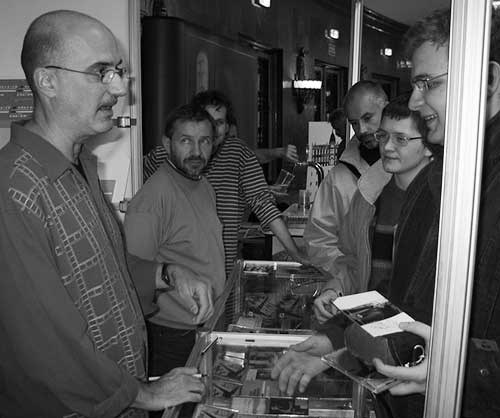Susan Brecker On the Legacy of Her Husband, Michael and the Saxophone Competition in His Name

If you’ve found your way to this article, chances are pretty good that you know who Michael Brecker is. Chances are also pretty good that you’ve spent many a listening session in awe of his legendary, unparalleled command of the saxophone as well as his often-imitated-never-duplicated improvisational vocabulary. For most of us, he ranks at, or near, the very tippy-top of our list of favorite saxophonists.
For those not familiar with Michael Brecker’s name, I can assure you that you’ve heard his playing – whether it was on a classic pop record by James Taylor, Paul Simon, or countless other pop and rock legends, or on a jazz record by – well, just about any, and I do mean, quite literally, any major jazz artist. With 15 Grammys to his name, he is without a doubt one of the most imitated saxophonists in the history of instrument, and very likely the most recorded saxophonist of all time.
Celebrating Michael’s Legacy
In January of 2007, the world lost a musical giant and an amazing all-around human being when Michael passed away due to complications of leukemia stemming from a rare form of bone cancer. Since then, his wife, Susan Brecker has taken it upon herself to memorialize his legacy in a myriad of ways. including producing an acclaimed documentary titled, More To Live For, which follows the stories of her husband as well as two other courageous patients living with the same form of cancer that Michael was diagnosed with.
Susan also produces a recurring all-star concert titled, The Nearness of You which over the years has featured stars such as James Taylor, Bobby McFerrin, Hugh Jackman, Chris Potter, Wynton Marsalis and Diana Krall to name a few. Proceeds from the shows go to cancer research.
Supporting the Next Generation of Saxophone Greats
One of the latest projects that Susan has been involved in is the Michael Brecker International Saxophone Competition, which is set to take place at the Red Sea Jazz Festival in Eilat, Israel, August 25-27, 2019.
In the following interview, Susan recounts memories of her husband’s passion for music as well as his ardent support of younger saxophonists. She also shares the news about a very special competition for up-and-coming saxophonists.
The Interview
Doron Orenstein: The first, and probably most obvious question – what is it that inspired you to put on this competition?
Susan Brecker: Michael was always inspired by young musicians. After he passed, Herb Alpert called me and wanted to do something in Michael’s memory — a competition, perhaps. This felt right to me and after many years we are finally kicking it off.
DO: Many saxophonists who got to be in Michael’s presence would muster up the courage to introduce themselves only to be taken aback by Michael’s humility, as they got to experience a truly inspiring and meaningful conversation with their idol. What do you think it was that drove Michael to sacrifice so much of his time when we was already unbelievably busy?
SB: Michael never perceived spending time with musicians as a ‘sacrifice’. He believed everyone who reached out was deserving of what time he could provide — and he got as much out of these encounters as aspiring sax players did. For Mike, the act of giving of himself to others was important to thim; and he learned from everyone. Mike was not just generous but curious.
DO: Out of the many saxophonists that Michael admired – were there any names that might surprise us? Perhaps saxophonists who might have been frowned upon by much of the jazz, or perhaps were highly obscure?
SB: Not really… he listened to everyone, and found something interesting in all styles of playing.
DO: The impression I got was that Michael was a lifelong learner and never satisfied to rest on the laurels of being a living legend. Can you share what it was he seemed to be working on the most when he was home between tours?
SB: Michael practiced. He was a really good drummer, and played every morning for an hour. Then he would hit the saxophone, composing, listening, etc. Michael went through phases of listening to music of different cultures that would inevitably inspire future compositions. For example, he was listening to a lot of Irish music when he wrote “Itsbynne Reel.” And before he became ill, he became immersed in gypsy music — specifically Bulgarian gypsy music. He studied the complex time signatures for a year, and began composing tunes in that style. He’s written some amazing tunes, which hopefully will be recorded at some point.
DO: Moving on to the competition, the website states that applicants will be “evaluated based on a variety of criteria that includes your technical facility, rhythmic feel, imagination and your interplay with fellow band members” – all qualities which I think it would be safe to say Michael would be looking for if he were judging the competition himself. That said, is there anything else you think Michael would have looked for in a saxophonist competing for this award?
SB: Generally Michael valued honesty and sincerity and more specifically in the paths musicians take in their creative journeys. He loved players who followed their own musical instincts — whether they be original or not. That said, he had greater admiration for those who created something fresh and different and who continued to refine and define their work as they move through their creative lives.
DO: Following up on the previous question – how relevant is an applicant’s chosen style of playing? Could the winner end up being someone who sounds absolutely nothing like Michael?
SB: Of course! The last thing we would ever encourage is someone to be “Like Mike.” In the context of the competition, originality is incredibly important. We are hoping entrants will embrace the competition as an opportunity to present who they are as players, not how well they can play like Michael. I believe Michael would tell the applicants to be true to themselves and not to try and sound like any one player. Playing what they feel is the the most honest expression they can offer.
DO: Being that you are based in the United States, how did it come about that the semi-final and final competitions are set to take place in Israel?
SB: Michael appeared in the first Red Sea Jazz Festival and decades later the Festival held a bone marrow drive in his honor when he was to perform and couldn’t attend. The current artistic director, Eli Degibri, loved Michael, and he wanted to champion and honor Michael’s legacy in the context of the Festival — something which Eli’s predecessor Danny Gottfired had initiated. We’ve long felt it was a lovely idea.
Ready to Throw Your Hat in the Ring?
For all the details on entering this year’s competition, please visit the website at http://breckercompetition.org. If you’re a serious saxophonist looking to make a life in music, I’d highly recommend applying. Regardless of the results of your entry, the submission requirements are sure to stimulate your own creative process, and who knows – you may find yourself in Eilat, Israel, paying homage to one of the all-time saxophone greats this August – and wouldn’t that be amazing?







March 7, 2019 @ 4:43 pm
Great Doron!!
Thanks.
Louis
March 12, 2019 @ 9:54 am
Nothing compared to what you do, Louis, but I appreciate the support! :)
March 25, 2019 @ 9:33 pm
Doron: Nice interview w/Susan Brecker. Michael was a true inspiration to me when he came to the Atlantic Fleet Band in Sept. 2003. He was very humble but he laid everything on the line when he listened to our groups.
Well you ca go bac to read my article on this site f you have questions. Please direct Susan Brecker to my article. i hope she will like it.
Take care ,
Larry W
September 5, 2020 @ 5:26 pm
It was the first few days of 10th grade and I was told that I would be playing baritone sax in the Dance Band. As I opened the band room door I heard a tenor sax being played. In that instant I knew that whoever was playing that instrument was exceptional. I had listened to jazz all my life as my
father had many jazz records. I had even started to listen to John Coltrane and had A Love Supreme. It was completely foreign to me but intriguing.
But I never heard a live tenor being played with such dexterity and speed. Michael was just warming up playing G minor triplets. It didn’t matter. Whoever he was, he was exceptional. We became friends and I would hang with Michael after school at his house and never doubted that this 12th grader would some day set the world of music on fire.
He was very proud of his family and their musical accomplishments. I started to take a few lessons from his teacher, Vince Trombetta, but my father had other plans and soon stopped that.
Michael was a great friend and mentor and as you all know, a sweetheart of a person. When I would see him in the hall walking ahead of me I would get up next to him and call his name. It took several times at increasing volume as he was in his own head. I never felt that he was ignoring me or putting me off because he was always glad to see me.
He confided in me once in that year that he didn’t know if he would like being a poor struggling musician in New York. I didn’t say anything but thought if was to be, it wouldn’t be for long.
He listened to many of the great tenor players and turned me on to King Curtis. But there was one tenor player who he treasured above the rest, John Coltrane.
I think about him most days. When he was in the hospital, Randy played the Elephant Room in Austin where I live, I tried to come over to his table to introduce myself and ask about Michael. But every time I would take a few steps I would tear up. I never did make it.
I allowed myself to fantasize that my blood sample would be a match and he would ask me what he could do for me, for saving his life. “Tell me every story you know about John Coltrane”, would have been my answer. It would have taken days. It would have been glorious….
September 6, 2020 @ 9:18 am
What a great story, Steve! As it happens, you and I have 2 things in common – 1) I also live in Austin and 2) I also studied with Vince Trombetta (I grew up in Agoura Hills where Vince now lives).
Thanks for sharing!
September 7, 2020 @ 2:52 pm
Hi Doron, well that’s an amazing connection. I actually was on the Mike Douglass Show right before he moved to LA. I was fake playing (lip sync) with a group called Frank Stallone and Valentine. It was nice to see Vince. I’m not in Austin anymore having left last week hauling a camper to be with my girlfriend who lives in Petaluma California. We met up this morning in a little town, Helper Utah, where Amtrak stops. She used to live in Austin many years ago and hopefully we will return after the virus. I have rented my house out in Lago Vista for the year so hopefully it won’t be before that. I see that your website is selling the book by Leibman on sax sound production. I ordered that a few months ago but it never came and I don’t think I was charged. So I just let it go. Who are you playing with in Austin? Or should I say who did you play with before the virus hit. My email address is Sweetstavin@gmail.com. Good luck in all your endeavors. I look forward to meeting you one day soon.